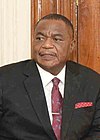
The Zimbabwe Defence Forces (ZDF) are the military forces responsible for the defence of Zimbabwe against external threats from other countries, and also to suppress internal armed factions. It is composed of the Zimbabwe National Army (ZNA) and the Air Force of Zimbabwe (AFZ).. Since December 2017 the ZDF is headed by General Philip Valerio Sibanda.
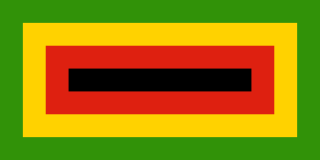
The Zimbabwe African National Union – Patriotic Front (ZANU–PF) is a political organisation which has been the ruling party of Zimbabwe since independence in 1980. The party was led for many years by Robert Mugabe, first as prime minister with the Zimbabwe African National Union (ZANU) and then as president from 1987 after the merger with the Zimbabwe African People's Union (ZAPU) and retaining the name ZANU–PF, until 2017, when he was removed as leader.

Joshua Mqabuko Nyongolo Nkomo was a Zimbabwean revolutionary and politician who served as Vice-President of Zimbabwe from 1990 until his death in 1999. He founded and led the Zimbabwe African People's Union (ZAPU) from 1961 until it merged in 1987 with Robert Mugabe's Zimbabwe African National Union (ZANU) to form ZANU–PF after an internal military crackdown called Gukurahundi in western Zimbabwe, mostly on ethnic Ndebele ZAPU supporters.
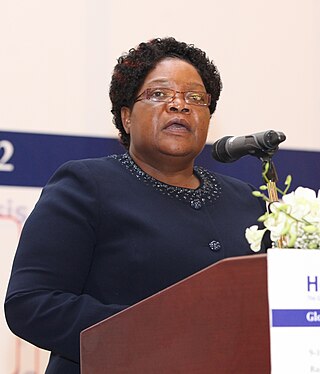
Joice Runaida Mujuru, also known by her nom-de-guerre Teurai Ropa Nhongo, is a Zimbabwean revolutionary and politician who served as Vice-President of Zimbabwe from 2004 to 2014. Previously she had served as a government minister. She also served as Vice-President of ZANU–PF. She was married to Solomon Mujuru until his death in 2011 and was long considered a potential successor to President Robert Mugabe, but in 2014 she was denounced for allegedly plotting against Mugabe. As a result of the accusations against her, Mujuru lost both her post as Vice-President and her position in the party leadership. She was expelled from the party a few months later, after which she formed the new Zimbabwe People First party.

Perrance Shiri was a Zimbabwean air officer and government official who served as Minister of Lands, Agriculture and Rural Resettlement in the Cabinet of Zimbabwe from 1 December 2017 until his death on 29 July 2020. He was the commander of the Air Force of Zimbabwe and member of the Joint Operations Command which exerts day-by-day control over Zimbabwe's government.

The Zimbabwe National Army (ZNA) is the primary branch of the Zimbabwe Defence Forces responsible for land-oriented military operations. It is the largest service branch under the Zimbabwean Joint Operations Command (JOC). The modern army has its roots in the Rhodesian Army, which was raised between 1963 and 1964 after the breakup of the Federation of Rhodesia and Nyasaland. A Joint High Command created in March 1980 to oversee integration of the formerly belligerent Rhodesian Security Forces, Zimbabwe African National Liberation Army (ZANLA), and the Zimbabwe People's Revolutionary Army (ZIPRA) officially established the Zimbabwe National Army in late 1980, nearly a year after the end of the Rhodesian Bush War.

Solomon Mujuru, also known by his nom-de-guerre, Rex Nhongo, was a Zimbabwean military officer and politician who led Robert Mugabe's guerrilla forces during the Rhodesian Bush War. He was an influential figure in Zimbabwe's post-independence politics.
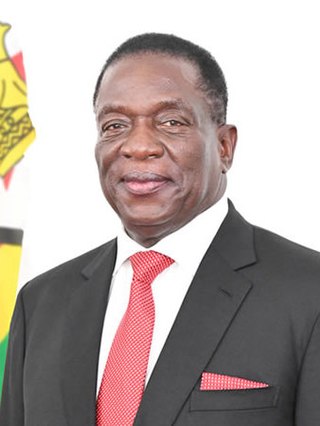
Emmerson Dambudzo Mnangagwa is a Zimbabwean politician who is serving as the third president of Zimbabwe since 2017. A member of ZANU–PF and a longtime ally of former President Robert Mugabe, he held a series of cabinet portfolios and he was Mugabe's first-vice president from 2014 until 2017, when he was dismissed before coming to power in a coup d'état. He secured his first full term as president in the disputed 2018 general election. Mnangagwa was re-elected in the August 2023 general election with 52.6% of the vote.
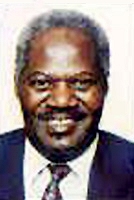
Air Chief Marshal Josiah Tungamirai, born Thomas Mberikwazvo, was a Zimbabwean military officer and politician. He was commander of the Air Force and later served as Minister of State for Indigenization and Empowerment in President Robert Mugabe's government before his death in 2005.
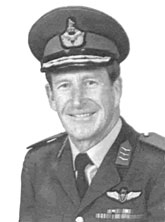
Air Marshal Norman Walsh was a senior officer in the Rhodesian Air Force and the first commander of the Air Force of Zimbabwe.
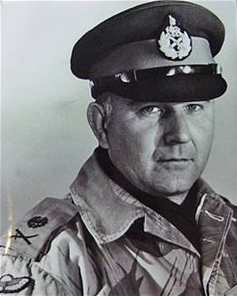
Lieutenant General George Peter Walls was a Rhodesian soldier. He served as the Head of the Armed Forces of Rhodesia during the Rhodesian Bush War from 1977 until his exile from the country in 1980.
The Zimbabwean government claimed to have foiled a coup d'état attempt involving almost 400 soldiers and high-ranking members of the military that would have occurred on June 2 or June 15, 2007. The alleged leaders of the coup, all of whom were arrested, were retired army Captain Albert Matapo, Colonel Ben Ncube, Major General Engelbert Rugeje, and Air Vice Marshal Elson Moyo.

The Police Support Unit, also known by their nickname of the Black Boots, is a paramilitary wing of the Zimbabwe Republic Police. They were founded as a native police force but later developed into a counter-insurgency unit of the British South Africa Police in Rhodesia during the Rhodesian Bush War. The unit was the only paramilitary unit retained by the Zimbabwe Republic Police after the country's reconstitution as Zimbabwe.
The Joint Operations Command (JOC) is the supreme organ for the coordination of state security in Zimbabwe. It was established by the Rhodesian Security Forces as Combined Operations Headquarters to supervise its counter-insurgency campaign in the Rhodesian Bush War as well as external incursions into neighbouring countries such as Zambia and Mozambique. The JOC retained its role in the post-independence Zimbabwe Defence Forces, and has since been accused of manipulating elections and orchestrating political violence.
Vitalis Musungwa Gava Zvinavashe was a Zimbabwean general officer, politician and the first commander of the Zimbabwe Defence Forces "ZDF". Zvinavashe had modest academic credentials but was renowned among Zimbabwe’s military circles as a strategist.

Constantino Guveya Dominic Nyikadzino Chiwenga, is a Zimbabwean politician and former army general currently serving, since 2017, as the First Vice-President of Zimbabwe under President Emmerson Mnangagwa. In August 2020, he added the Health Ministry to his portfolio.
Air Marshal Frank Walter Mussell is a retired commander of the Rhodesian Air Force and of the Air Force of Zimbabwe.
Dunn Mabika Hove, also known as Paris Checherere was a Zimbabwean military intelligence officer who was one of the leaders of ZANLA, Robert Mugabe's guerrilla forces during the Rhodesian Bush War. A career soldier, in post-independence Zimbabwe, he went on to have a successful career in the Zimbabwe National Army, serving with distinction in UN and AU led peace keeping missions across Africa.

Combined Operations was a high level body established in 1977 to lead the efforts of the Rhodesian Security Forces during the Rhodesian Bush War. It was commanded by Lieutenant General Peter Walls. Prime Minister Ian Smith did not delegate formal authority to set overall policies or direct the actions of the security forces to Walls. The Combined Operations Headquarters also lacked the planning and intelligence staff needed to effectively carry out its functions. As a result, COMOPS mainly operated as an coordination body. Walls personally directed many attacks against Rhodesia's neighbours and other aspects of the war, at times independently of political control. Combined Operations was replaced by the Joint High Command following Rhodesia's transition to Zimbabwe in 1980.

